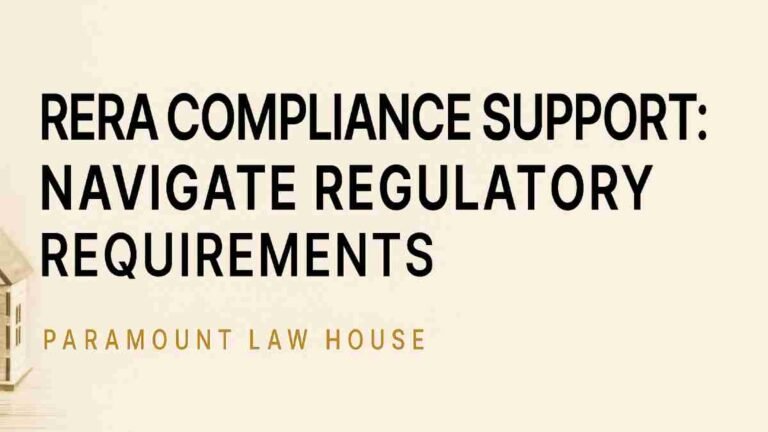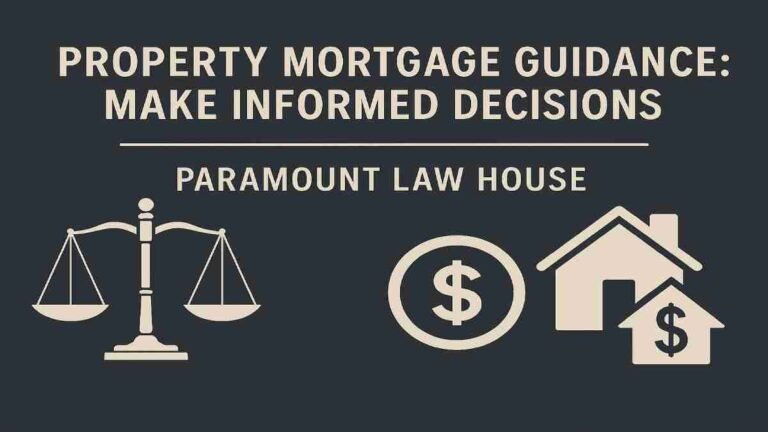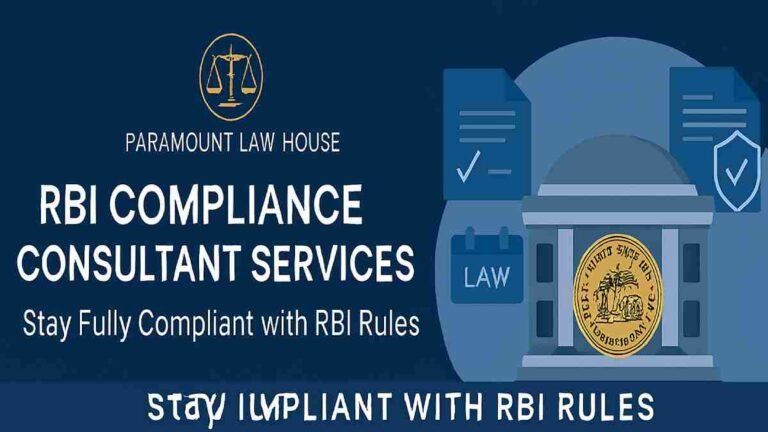Sale Deed Review: Ensure Legally Binding Documents
Buying or selling property is a major financial decision. It involves complex legal documents that can affect your rights and ownership for…
Buying or selling property is a major financial decision. It involves complex legal documents that can affect your rights and ownership for years to come. Among these, the Sale Deed is the most crucial document. It serves as legal proof of ownership and defines every term of the property transaction. However, a small error or unclear clause can lead to serious disputes later. That is why a Sale Deed Review by experienced property lawyers is essential.
At Paramount Law House: Property Lawyers 24×7, we help clients review and verify sale deeds with precision and legal expertise. Our goal is to ensure that every document you sign is legally binding, transparent, and compliant with the law.
Sale Deed Review: Ensure Legally Binding Documents: Paramount Law House
What Is a Sale Deed?
A Sale Deed is a legally binding document that transfers ownership of property from the seller (vendor) to the buyer (purchaser). It records the sale terms, the consideration amount, and the rights and liabilities of both parties. Once executed and registered, the sale deed becomes conclusive evidence of ownership under the Transfer of Property Act, 1882 and the Registration Act, 1908.
In simple words, this deed is your legal title to the property. Without a valid and properly drafted sale deed, your ownership rights can be challenged.
Why Reviewing a Sale Deed Is So Important
Every clause in a sale deed holds legal weight. Even a minor drafting mistake can cause long-term issues. Therefore, a detailed legal review helps identify risks, inconsistencies, and non-compliance before you sign.
A professional review ensures:
- The property has a clear and marketable title.
- There are no hidden encumbrances, charges, or pending litigations.
- The terms protect your interests as per Indian property law.
- The document complies with stamp duty and registration laws.
Thus, reviewing the sale deed protects you from legal complications, fraud, and financial loss.
Common Legal Terms in a Sale Deed
A well-drafted sale deed includes several legal clauses that define the transaction clearly. Understanding these terms helps you know your rights and duties.
- Parties Clause: Mentions the full names, addresses, and identification details of the buyer and seller.
- Recitals: Describes how the seller acquired ownership of the property.
- Consideration Clause: Specifies the total sale amount and the mode of payment.
- Property Description: Gives complete details of the property — boundaries, measurements, survey numbers, and location.
- Encumbrance Clause: States whether the property is free from legal dues, mortgages, or disputes.
- Delivery of Possession: Indicates when the buyer will get possession of the property.
- Indemnity Clause: Protects the buyer if any legal issue arises later regarding ownership.
- Covenants: Lists the promises made by both parties during the transaction.
- Jurisdiction Clause: Determines which court will handle disputes.
Each of these clauses must be carefully reviewed to ensure fairness and legality.
Legal Risks of Ignoring Sale Deed Review
Many property buyers skip legal review to save time or money. Unfortunately, this often leads to costly litigation later. Here are some common risks of signing a sale deed without review:
- Title Disputes: The seller might not be the true owner, leading to challenges from third parties.
- Hidden Liabilities: Unpaid taxes, loans, or encumbrances might exist on the property.
- Fraudulent Transactions: Fake documents or signatures can invalidate your ownership.
- Improper Stamp Duty: Understamping can make the deed invalid in court.
- Non-Compliance with RERA or Local Laws: Violations can result in penalties or cancellation of the sale.
A thorough review by property lawyers prevents these legal risks and ensures that your investment remains safe.
How Lawyers Review a Sale Deed
At Paramount Law House: Property Lawyers 24×7, we follow a systematic legal review process. Our team of real estate experts examines every clause and checks for legal compliance.
- Title Verification: We verify ownership documents, previous deeds, and encumbrance certificates.
- Document Scrutiny: We ensure that the sale deed matches the terms in the agreement for sale.
- Stamp Duty and Registration Check: We calculate the correct stamp duty and ensure registration at the Sub-Registrar Office.
- Clause Analysis: We review every clause to ensure it protects your interests.
- Legal Opinion: We provide a written opinion highlighting risks and suggesting corrections.
Through this process, we make sure that the final sale deed stands valid and enforceable in a court of law.
Key Legal Requirements for a Valid Sale Deed
For a sale deed to be legally binding, it must meet several statutory conditions. Our lawyers ensure compliance with these requirements to avoid future disputes.
- Proper Execution: Both parties must sign the document in the presence of two witnesses.
- Adequate Stamp Duty: The deed must be stamped according to the value of the property.
- Registration: The document must be registered under the Registration Act, 1908, within the prescribed time limit.
- Free Consent: The transaction must be free from coercion, fraud, or misrepresentation.
- Competence of Parties: Both buyer and seller must be legally capable of entering into the contract.
When these conditions are fulfilled, the sale deed becomes valid, enforceable, and legally binding.
Differences Between Sale Deed and Sale Agreement
Many people confuse a Sale Agreement with a Sale Deed, but they serve different purposes. The sale agreement is a promise to transfer property, whereas the sale deed is the actual transfer of ownership.
- The sale agreement sets future terms, conditions, and obligations before the sale is finalized.
- The sale deed confirms that the sale is complete and ownership has transferred.
Therefore, even after signing a sale agreement, the buyer does not become the owner until the sale deed is executed and registered.
Legal Documents to Verify Before Sale Deed Execution
Before finalizing a sale deed, lawyers conduct a detailed due diligence process. This includes checking essential documents like:
- Mother deed or parent document of title.
- Encumbrance certificate from the sub-registrar office.
- Approved building plan or layout.
- Property tax receipts and utility bills.
- Completion or occupancy certificate (for flats).
- Mutation or revenue records.
These documents confirm the legal status of the property and ensure that the seller has the right to sell it.
Importance of Legal Assistance
Even though sale deeds may seem straightforward, they often involve technical legal language. Without expert review, you may overlook key terms that affect ownership, liability, or rights of use.
Having legal assistance ensures:
- Clarity in drafting and interpretation.
- Compliance with state-specific real estate laws.
- Protection against fraud or hidden conditions.
- Peace of mind during property transactions.
At Paramount Law House, our lawyers work round the clock to help clients with sale deed reviews, drafting, registration, and title verification. We aim to safeguard your investment through professional and practical legal solutions.
Common Mistakes Buyers Make
Despite knowing the importance of legal review, buyers often make avoidable errors. Some of the most common mistakes include:
- Signing the deed without reading or understanding every clause.
- Ignoring discrepancies in property boundaries or survey numbers.
- Not checking the encumbrance certificate.
- Failing to ensure the seller’s name matches government records.
- Overlooking unpaid dues or pending litigations.
Each of these mistakes can lead to financial and legal complications. A lawyer’s review prevents them effectively.
How a Reviewed Sale Deed Protects You
A reviewed sale deed acts as a legal shield. It confirms that your property rights are recognized and enforceable. Moreover, it ensures that the transaction stands valid even if challenged in court.
With a properly reviewed and registered sale deed, you get:
- Legal ownership of the property.
- Freedom from hidden liabilities.
- Peace of mind knowing your investment is secure.
- Strong legal protection in case of disputes.
That’s why reviewing your sale deed is not just a legal formality but a safeguard for your future.
Why Choose Paramount Law House
At Paramount Law House: Property Lawyers 24×7, we specialize in real estate law, property disputes, and documentation. Our lawyers combine legal acumen with practical experience to guide clients through every step of a property transaction.
We provide:
- 24×7 legal support.
- Expert document drafting and vetting.
- Transparent guidance and communication.
- Affordable legal services for individuals and businesses.
Our firm has earned trust by ensuring that every client’s property transaction is safe, compliant, and worry-free.
Frequently Asked Questions
The main purpose of reviewing a sale deed is to ensure that the document is legally valid, accurate, and protects your ownership rights. A professional review helps verify the property’s title, prevent fraud, and confirm that the terms comply with Indian property laws. It also ensures there are no hidden liabilities or errors that could cause disputes later.
A qualified property lawyer should review the sale deed before registration. Legal experts understand technical terms, identify risks, and verify compliance with the Transfer of Property Act and Registration Act. At Paramount Law House, our property lawyers carefully examine every clause and ensure the document safeguards your interests completely.
Essential documents include the previous ownership deed (mother deed), encumbrance certificate, property tax receipts, building approval plan, and ID proofs of both parties. These help confirm ownership, verify the property’s legal status, and ensure there are no pending disputes or dues.
Yes, a sale deed can be challenged in court if it involves fraud, coercion, or misrepresentation. However, if the deed is properly reviewed, executed, and registered with correct stamp duty, it becomes strong legal evidence of ownership and is difficult to dispute successfully.
Paramount Law House: Property Lawyers 24×7 provides expert sale deed drafting, vetting, and legal opinions. Our team ensures compliance with property laws, verifies ownership documents, and prevents legal risks. We work round the clock to make every transaction secure, transparent, and legally binding.
Conclusion
A Sale Deed Review is not just about checking paperwork. It is about protecting your property rights, ensuring transparency, and securing your investment for the future. Each word in a sale deed carries legal weight, and every clause must be reviewed with care.
At Paramount Law House: Property Lawyers 24×7, we believe that a well-reviewed sale deed builds the foundation for a peaceful and legally sound ownership. Whether you are buying your first home or investing in commercial real estate, our lawyers are here to assist you at every stage.
So, before you sign your next sale deed, take a moment to have it reviewed by legal professionals. It is the smartest step you can take to ensure that your document is legally binding, enforceable, and completely in your favor. Your peace of mind begins with the right legal review — and we are here to make it happen.
Read More
- Settlement of Self-acquired Property: Legal Solutions
- Stay Order Assistance: Protect Your Property Interests
- Succession Planning Made Simple: Legal Assistance Available
- Transfer of Property to Legal Heir after Death: Expert Advice
- Rent Recovery Services: Swift and Effective Solutions
- National Generic Document Registration System (NGDRS)






